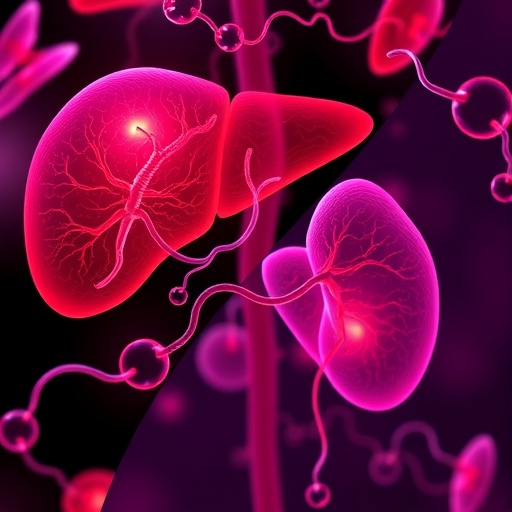In a groundbreaking study published in the Journal of Translational Medicine, researchers have uncovered the crucial role of hepatic macrophages in the liver’s microenvironment, particularly in the context of metastatic tumors. This discovery has far-reaching implications for our understanding of liver cancer, a condition that poses significant challenges due to its complex biology and the intricate interplay between various cellular components in the tumor microenvironment.
Hepatic macrophages, a subset of the innate immune system found in the liver, are now being recognized as key regulators in the microenvironment of liver metastatic tumors. Their dual role in either promoting or inhibiting tumor growth underscores their significance in cancer biology. It was previously understood that these macrophages could be influenced by signals from cancer cells, but this new research offers insight into the cellular crosstalk that fosters an environment conducive to cancer progression.
Wang, Yi, and Yang, along with their colleagues, employed a series of sophisticated techniques to investigate how hepatic macrophages contribute to tumor dynamics in the liver. They discovered that these macrophages can secrete a variety of cytokines and growth factors that not only support tumor cell survival but also facilitate metastatic spread. The findings suggest that modifying the activity of these macrophages could represent a promising therapeutic avenue for liver metastasis.
Central to this study was the examination of various signaling pathways that are activated in hepatic macrophages in response to tumor-derived signals. The researchers observed that when exposed to certain factors released by tumor cells, hepatic macrophages undergo a significant phenotypic shift. This shift enhances their ability to promote tumor growth and even aids in creating a fibrotic environment that is more favorable for cancer progression.
Interestingly, the research team also identified that the macrophages’ response to tumor signals is not uniform. Instead, distinct populations of hepatic macrophages display a range of behaviors, some of which impede tumor growth while others support it. This heterogeneous nature of macrophages in the liver adds a layer of complexity to cancer treatment strategies, highlighting the need for a more personalized approach to therapy.
Furthermore, the authors of the study discussed the implications of targeting hepatic macrophages in cancer therapy. By developing therapies that can selectively inhibit the pro-tumorigenic functions of these cells, it may be possible to enhance the effectiveness of existing cancer treatments. This could involve using agents that block specific signaling pathways or modifying macrophages to adopt a more immune-supportive phenotype.
The research draws attention to the importance of the tumor microenvironment in shaping cancer outcomes. Traditional cancer therapies often focus on eliminating tumor cells directly, but as this study illustrates, the microenvironment plays a pivotal role in tumor survival and growth. Understanding the interaction between hepatic macrophages and cancer cells provides a new perspective on how to approach liver metastasis.
As liver cancer continues to be a leading cause of cancer-related mortality worldwide, discoveries such as these are essential for improving patient outcomes. Given the rising incidence of liver metastatic diseases, findings that enhance our understanding of the cellular interactions in the liver are more critical than ever. The research by Wang and colleagues paves the way for novel therapeutic strategies that could disrupt the supporting roles played by hepatic macrophages.
In summary, the findings presented in this comprehensive study highlight a crucial aspect of liver cancer biology: the role of hepatic macrophages in the metastatic microenvironment. By elucidating these cellular interactions, the researchers set the stage for future investigations aimed at thwarting liver metastasis and improving treatment responses. Such groundbreaking research not only advances our basic understanding of cancer biology but also opens new doors for innovative therapeutic interventions.
This study marks a vital step in integrating immune microenvironment dynamics into cancer research and treatment, showcasing how immune cells, like hepatic macrophages, are not mere bystanders but active participants in the progression of liver tumors. The emphasis on the necessity for further research into the dual role of these macrophages cannot be overstated—it may very well hold the key to unlocking more effective treatments for liver metastasis.
In conclusion, the research underscores the importance of understanding and targeting the cellular crosstalk within the liver’s tumor microenvironment. It reaffirms the potential of hepatic macrophages as therapeutic targets and emphasizes the need for continued exploration of the complex interactions between tumor cells and the immune components in liver cancer.
Understanding the intricate dynamics of hepatic macrophages provides hope that innovative therapeutic strategies can transform the landscape of liver cancer treatment, turning what is often a dire prognosis into manageable, treatable conditions that allow for improved quality of life and survival rates.
To ensure that this important study spurs further investigations, the authors encourage the scientific community to consider the implications of their findings and to explore the therapeutic possibilities that could arise from targeting the hepatic macrophage population in liver cancers.
In the realm of oncology, where research is rapidly advancing, studies like this remind us of the potential that lies in understanding and manipulating the immune landscape of tumors, offering new avenues for combatting one of the most resistant forms of cancer we face today.
Subject of Research:
Hepatic macrophages and their role in liver metastatic tumor microenvironment.
Article Title:
The hepatic macrophage: a key regulator of liver metastatic tumor microenvironment through cell crosstalk.
Article References:
Wang, W., Yi, Z., Yang, Z. et al. The hepatic macrophage: a key regulator of liver metastatic tumor microenvironment through cell crosstalk.
J Transl Med 23, 1334 (2025). https://doi.org/10.1186/s12967-025-07376-4
Image Credits: AI Generated
DOI:
https://doi.org/10.1186/s12967-025-07376-4
Keywords:
Hepatic macrophages, liver cancer, metastatic tumors, tumor microenvironment, immune cells, cancer therapy.
Tags: cancer cell signaling and macrophagescellular crosstalk in metastasishepatic macrophages in liver cancerinnate immune system and liver tumorsinnovative research in cancer immunologyliver cancer biology and treatment implicationsliver metastasis and immune responsemacrophage influence on tumor growthmetastatic tumors in liver microenvironmentrole of cytokines in cancer progressiontherapeutic targeting of hepatic macrophagestumor microenvironment and macrophage interaction





